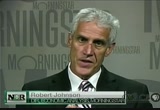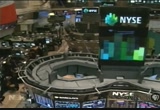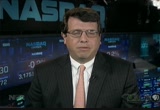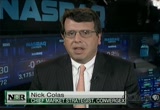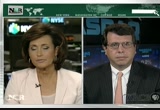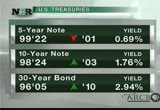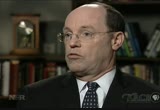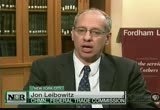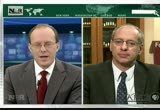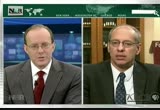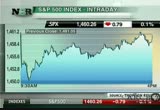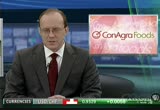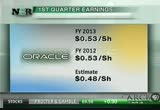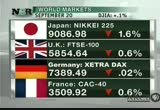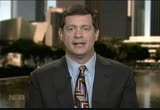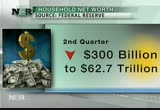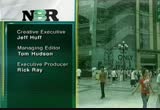tv Nightly Business Report PBS September 20, 2012 4:30pm-5:00pm PDT
4:30 pm
>> this is n.b.r. >> tom: good evening. i'm tom hudson. from china and japan to europe, fresh signs of slowing economies raise new worries about global growth. >> susie: i'm susie gharib. the american government borrows billions from china, is it a threat or smart business? we continue our focus on the national debt. >> tom: and on capitol hill, new questions about the role of high frequency trading and u.s. markets. >> susie: that and more tonight on "n.b.r."! >> tom: there was more evidence today of the struggling global
4:31 pm
economy. stocks around the globe sank on weak japanese trade figures, as well as a drop in chinese manufacturing activity for the eleventh straight month. the news here wasn't better. the conference board's index of leading economic indicators edged down a 0.1% in august, suggesting growth will stay sluggish in the second half. so, it's no surprise that the international monetary fund announced today it plans to cut its global growth forecast by a few decimal points when it releases its report next month. the i.m.f.'s currently forecast calls for growth of 3.5% this year, and 3.9% next. erika miller reports. >> reporter: global economic growth appears to be hitting a wall. a "bric" wall that is. there's growing evidence that economic growth is slowing in virtually every part of the globe, even the world's fastest growing economies. the term "bric" was coined a decade ago to refer to brazil, russia, india and china. but if you were to rank the countries by economic importance, the order would be reversed. >> china's been the engine of global growth a very, very long time. and, now because of its
4:32 pm
deceleration, it's becoming the drag on global growth, if you will. and that's part of the maturation process. >> reporter: but, for now, at least, it doesn't look like the chinese economy is headed for a hard landing. in 2010, china's growth was over 10%. last year it was 9.2%. this year, the i.m.f. expects it to fall to 8%. but that's still a lot better than what's expected in the u.s. next year. >> i'm predicting 2% to 2.5% g.d.p. growth, nothing wild. probably a bit lower than the last 30 year average, but not that far below. the last 30 year average is 2.7% to 2.8%. >> reporter: and even that's better than the situation in the europe, where many countries are already in recession. the i.m.f. predicts growth for the eurozone as a whole will contract 0.3% this year, after growth of 1.5% last year. against that backdrop, you might think emerging markets like china offer the best investment opportunities.
4:33 pm
but portfolio managers say it's not always smart to chase growth. >> europe has sold off a lot. a lot of european companies and countries are selling at or near the 2009 low and so, the valuations, when you look across the world in the equity space, the valuations of european companies, particularly the high quality companies is very, very attractive. >> reporter: they may be attractive, but for many investors, investing in europe is just too risky. plenty of people would rather stick with the comfort of the us stock market, which is trading at multi-year highs. erika miller, "n.b.r.," new york. >> susie: stocks spent much of the day in negative territory as those worries about the global economy weighed on wall street, but late buyg in the blue chips turned the dow positive. the dow closed up almost 19 points, the nasdaq fell six, the s&p down almost a point. joining us now, for more analysis, nick colas, chief market strategist at convergex.
4:34 pm
so nick, that economic data from china certainly got everybody's attention this morning. and some people are even wondering whether the economy in china is slowing more than we think. what are your thoughts on that? >> it's very good the chinese econom is slowing. that number is actually not all that disappointing but it was the 11th straight month where chinese producers said that business is slowing. so china is clearly on a slower growth path and one that could tip over particularly given the wranglings that we have seen with japan most recently. >> all right so, china is slowing. europe is in a recession. what does all this mean for american businesses. and the federal reserve's promise to save the economy and to create more jobs? >> well, it's very good the federal reserve has a long road ahead of it. the global economy as you rightly point out is slowing. the u.s. economy is not in great shape as it is. unemployment is still over 8%.
4:35 pm
and so the federal reserve through the plans it announced last week is really trying to push liquidity into the system to grow the economy further. same with the ecb, same with bank of japan. central banks around the world are trying their level best to get their economies going again but it is a very tough slog. >> and you were telling me that even though the central banks are putting a lot of stimulus into the economy in every corner of the world, that the global economy is heed for a recession. tell us why? >> yes, it's very clear that recessions are a normal course of the economic landscape. they come every five to seven years. we're four years into a recovery. and so i think it's very logical to worry and at the same time expect a recession perhaps, a global recession as early as next year given all the data we're getting currently even with the impetus of all the central banks pushing liquidity into the system. >> susie: all right so, what does all of this mean for investors and for the stock market. are we going to see a pullback because of all of these ression concerns down the road?
4:36 pm
>> well, it's very clear central banks are trying to maintain equity markets where they are currently so i don't expect a big pullback. i don't see a lot of room for upside either. i think the smartest way to go is a diversified portfolio and i think the single aspect to protect investors are corporate bond, high quality corporate bonds, solid companies with good credit ratings. >> susie: let's take a little bit more about what its options are, most investors especially the ones that are risk averse are concerned about putting their money still in equities. and the other hand there are very few places where you can get, because of low-interest rates where you can get some good yields. so yeah, you say corporate bonds. what else? and even with corporate bonds what are you talking about. >> that's right. it's very, very tough to get yield here. there are a lot of investors, a lot of constitutional-- institutional investors interested in dividend paying stocks. that is a reasonable strategy as long as they are diversified. you have to remember you can lose the three, three and a half percent of portfolio
4:37 pm
stocks in a day or two of a bad market and then you only have that yield to make it back over the course of year. so stocks are still going be volatile, no doubt about it. >> susie: all right, we'll leave it there, thank you so much, nick colas of convergex group. >> reporter: coming up on "n.b.r.," element is just one of starwood hotel's nine brands. we'll speak to the company's c.e.o. and get his outlook for the rest of the year. >> tom: seven cents of every dollar borrowed by the u.s. government is owed to china. china is the single largest foreign holder of u.s. debt, over $1.1 trillion as of july. as we continue our look at the u.s. debt, tonight we examine whether or not china's massive holdings give it leverage over the u.s. darren gersh reports from washington d.c. >> reporter: when the u.s. was preparing a $5 billion deal to sell arms to taiwan last year, a chinese columnist at the influential people's daily fired a warning shot: it was time for china to use it's "financial
4:38 pm
weapon" to teach the u.s.a. a lesson. since then, the pentagon and other security analysts have come to think of the threat china will use its trillion dollar plus portfolio of treasury bonds to punish the u.s. as something of a bluff. >> it's always out there as a possibility, but i think the weight of the evidence, particularly from economists has been that it's not a credible threat. that the cost to them would probably be larger than the cost to us. >> reporter: inside china, there are conflicting views of beijing's role as banker to the united states government. some see it as a source of leverage, but others see chinese holdings of u.s. debt as an investment with little return. >> it's not invested in their own country. it hasn't been given to their own people. it's a gigantic waste of money. and really, it does not give china verage over the u.s., becausif they us it, they'd only be shooting themselves in the foot. so, in that respect, i think it's as much a symbol of a weak imbalances in the chinese economy as it is of chinese power.
4:39 pm
>> reporter: and even if the chinese government wanted to sell off u.s. treasuries, it's not clear it could find a buyer. >> the bigger problem is if they announced that they were simply not going to participate in the next treasury auction or the next three or four treasury auctions. that would produce something of a scramble to see who would participate. the result would probably be some increase in interest rates here. >> reporter: but even that seems likely to hurt china as much or more than the united states. china buys u.s. treasuries to recycle the dollars it makes after selling goods into the u.s. market. in return, the u.s. enjoys lower interest rates because it has a large, almost captive buyer. >> i think we have mutual dependency in terms of economic. we used to call it mutual assured destruction between the soviet union and the united states in the war sense and in the nuclear sense. in the economic sense i think we ha a mutual suretype of survival between the united states and china because we are dependent on each other.
4:40 pm
>> reporter: our relationship with china is often uneasy. but china's huge pile of u.s. treasury debt is a sign of how closely connected our two economies have become. darren gersh, "n.b.r.," washington. >> susie: high-frequency trading came under fire today on capitol hill. a former trader told a senate panel the high-speed, automated nature of trading has thrown stock markets into "dire straits." he and other industry insiders outlined what they think is ailing modern markets, and the remedies that could help. sylvia hall reports. >> reporter: facebook's botched
4:41 pm
i.p.o. trading glitches that caused the bats exchange to withdraw its own stock offering, and knight capital's huge one-day loss last month. we've all seen the expensive consequences of high-speed, electronic trading. today, senators heard about the problems caused by computers trading huge amounts of stocks in milliseconds. >> i'm certain that exchanges can be profitable and can work well as a for-profit enterprise, but perhaps we need to understand really what their role should be going forward, who they should be serving, and by the way- what's the role of a broker-dealer? >> rorter: questio like that took on new urgency in may 2010, when u.s. markets lost $1 trillion in about ten minutes, then gained back most of the losses. automated trading software took the blame for what's now called the "flash crash." >> there's been shockingly little done regarding our capital markets since the flash crash which was in may of 2010; well over two years ago. and the possibility of another flash crash, if not the probability is quite high.
4:42 pm
>> reporter: today's hearing was meant to start the process of curbing that threat. industry insiders offered solutions like creating a common set of ground rules across markets, and creating ways to identify and track individual orders. the goal is to reassure the public that american markets work fairly. >> if there's low confidence and low investor involvement, there's less ability for american companies to access those markets to get capital, to grow business and to create jobs, and basically so we have prosperity and growth. >> reporter: kelleher says he hopes finding some rules for high speed trading is a collaborative effort between the industry and regulators. sylvia hall, "n.b.r.," washington. >> tom: one of the billingest corporate deals of the year may not involve any u.s. company but it could have a big affect in america. the your mean parent company of airplane maker airbus and british defense contractor bae are still in early merger talks in what would create the world's largest
4:43 pm
aerospace and defence company. this would be just the latest international deal, though, facing-- facing international scrutiny from regulators. one of those is jon leibowitz, chairman of the federal trade commission joining us from new york. chairman, i know will you not comment on any specifics of any potential deal, boeing has called for a rigorous examination if this happened. generally speaking, how does your agency approach these kind of international reviews. >> what we try to do and what the anti-trust division also tries to do defend-- depending on who revows a merger is to look at it, to see whether the deal may, may affect, adversely affect competition. and if it does, we generally try to block the merger. and if it doesn't we generally try to let it go through. there is - an thisis important to let deals go through when that's appropriate under our statute as it is to challenge deals that might be anti-competitive. >> tom: usually it's about defining the market. so when have these
4:44 pm
crossborder big deals how do you define the market. dow look exclusively on the impact at american companies and consumers. >> oy a fundamental you look to see whether it will raise prices or reduce choices for american consumers. if it has an affect on the united states commerce, commerce of the united states, and if this affect is adverse, then following the statute that congress wrote for us, we're supposed to challenge the deal. >> tom: we have european regulators stop u.s. companies from merging a decade ago, ge and honeywell were stopped because of the eu, this year the nyse had to break apart their planned merger. is there a competition among international regulators. >> i think among international regulators or anti-trust enforcement agencies there is much more comedy than competition. so much commerce is global now and the lawsithin the european union and the united states have converged considerably over its last few decades. that for the most part, we
4:45 pm
usually come to the same conclusions on the same mergers. now there might be some differences when the market shares are different. and the economic effects are different in different geographic markets like the eu and the united states. >> one investigation that has been admitted to gooseel continues to be under review by your agency, whether or not it's harmed competition. google has been talking with those european regular laters over competition. how close is your investigation working with the europeans when it comes to the google situation? >> companies that are being scrutinized by any anti-trust agency we feel particularly-- we feel particularly strongly at the ftc, don't deserve any particular outcomes but they deserve expeditious resolution of the investigation. and we do talk to our european counterparts from time to time. again we think that that is a good thing involving any instigation in which we
4:46 pm
ea are involved, when it involves the same company. >> chairman, we'll leave it there. jon leibowitz with us, the chairman of the federal trade commission. >> susie: trulia set up house at the new york stock exchange today. the web-based real estate listings firm, built strong gains, up 41% in its first day as a public company. trulia offered six million shares priced at $17 each. they closed the day up $7 at $24 a share even. investors are hoping trulia, can perform as well as rival zillow. that company's stock more than doubled since going public a year ago.
4:47 pm
>> susie: tom, besides trulia, four other companies went public today, three finished the day to the upside and one, higher, was flat. >> tom: pretty good indication of investor demands. let's get going with tonight's "market focus." >> tom: the weaker economic data from the u.s. and overseas hung over stocks, but the major indices cut earlier losses by the closing bell. the s&p 500 hit its lowest price of the day in the first half hour of ading. the losses were pared back through-out the session, to end with a fractional loss. volume was 675 million on the big board. 1.8 billion on the nasdaq. in the lead, the consumer staples sector up 0.6%.
4:48 pm
the industrial sector was the drag, down 0.9%. and it was a trio of railroad stocks weighing on the industrial sector. norfolk southern's earnings warning late yesterday hit shares today. the stock fell 9.1%, falling to its lowest price since june. a drop in shipping volumes and lower revenue from fuel surcharges got the blame for the disappointing outlook. itlso hishar of s.x. and union pacific. c.s.x. fell 5.7%. u.n.p. was down 3.3%. union pacific was at a new high last week. meantime, food stocks were in focus after earnings from conagra. earnings were eight cents per share stronger than expected, and a big jump from a year ago. sales volumes dropped, but conagra made up by higher prices. shareholders s higher prices, the stock was up 6.2% on heavy volume. this is a seven year high for shares. meantime, the battle over the single serve coffee market is heating up. starbucks launched its own version of single serve brewers,
4:49 pm
calling it the fastest growing segment of the coffee market, and going directly against green mountain coffee roasters. green mountain stock fell 9.6%. starbucks rallied 2.2%. green mountain currently has about 90% of the u.s. single cup coffee brewer market. after the closing bell tonight, the market focus was on oracle. the company's database software business has been a bright spot as it has struggled with its computer hardware unit. earnings per share came in on target at $.53. operating expenses were down, helping improve its profit margins. shares were down 1.6% before tonight's news, and the stock showed little movement in after hours action. earlier this week, oracle traded at an 11 month high. the weakest spot in the quarter, hardware sales, down double digits, but on tonight's conference call, oracle management expects hardware revenue growth to show up in about ne months. a day after warning the second half of the year will be as painful as the first half, j.c.
4:50 pm
penney shares saw heavy selling. the stock fell 11.2% as volume almost tripled. the department store has been trying to turn itself around, but it was unsuccessful in its effort to wean shoppers off of discount pricing. four of the five most actively traded exchange traded products were down. the s&p 500 tracking fund managed to squeak out a one penny gain. and that's tonight's "market focus." >> susie: while many are seeing slowing in china, starwood hotels sees the asian market as a major growth opportunity.
4:51 pm
the hotel ain opened its largest property yet in macau today on the cotai strip, an area known as the vegas of the east. ruben ramirez reports: >> reporter: at 4,400 rooms, it's the largest hotel in macau, and starwood's biggest property globally. >> for the first 2,000 hotel rooms we'll have open, we'll be sold out in the first week which is virtually unheard of for any hotel, let alone 2,000 rooms. >> reporter: starwood operates more than 100 hotels in china. it plans to double that number over the next few years. >> year to date we've signed deals to open more hotels this year than we did last year. so, our sense is that if there is a slowdown in the chinese economy, which there might be, we're not really seeing it in our business, the long-term prospects from the perspective of real estate developers and investors in china is still quite positive. >> reporter: it's not just asia that's busy, starwood says occupancy rates in europe are trending above 70% in key markets, despite challenges in
4:52 pm
the eurozone. >> you have the big gateway markets that are outperforming. so in europe that's going to be london, that's going to be paris. when you get into the secondary and tertiary markets its more difficult, but for starwood, europe is only about 15% of their total profitality. >> reporter: globally, its two types of travelers that are still spending: business and high-end luxury travelers. >> what i can tell you is, so far is that no customer is traveling less this year than they did last year. and in the discussions we're having going into 2013 they continue to say they have extensive travel plans. >> reporter: and those customers could find fewer vacant rooms. a lack of supply of new hotels in the u.s. and higher demand could be a boon for operators. starwood wants to build up its newest brand called element, but it's been difficult. >> the one challenge we have for element right now is because there is no construction financing there are very few new hotels being built and the unique nature of the element brand would require almost all
4:53 pm
of them to be new build hotels and what we have is a very small, very successful brand that is waiting for construction financing to come back to the u.s. market. >> reporter: despite the slowdown in new hotel construction here at home, van sschen says the tel chain has a fortress balance sheet and is ready to make acquisitions if opportunities arise. ruben ramirez, "n.b.r.," new york. >> tom: tomorrow on "n.b.r." with signs of slowing in the global economy, we'll see where our friday "market monitor" guest is seeing opportunity now. he's chris orndorff of western asset management. >> susie: as we reported a whole new batch of companies made their debuts in the stock market today, selling shares to the public for the first time ever. but tonight's commentator points out, newly public companies can be a tough go for everyday investors. here's eric schurenberg, editor- in-chief at inc.
4:54 pm
>> reporter: not long ago going public was every startup company's fantasy. the i.p.o. was the big payday: you and your venture investors got rich and your company got a public seal of approval. not any more. from 2001 to last year, the number of i.p.o.s dropped by 80%. rather than going public, the majority of startups now say the most attractive exit is to be sold to anher mpany. c.e.o.s on the inc. 500 list of fastest-growing private companies, say they preferred that way out by a margin of four to one. and you can't blame them. going public is a pain. it requires disclosure of your finances, for your competitors and everyone else to see. and a lot of entrepreneurs don't like running a company with wall street looking over their shoulder. i.p.o.s haven't been all that great for public investors, either, as you'd know if you bought facebook, groupon, or zipcar on their first day of trading. one issue there is that private valuations, at least for tech companies, are so high before they go public that there's very little left for public shareholders.
4:55 pm
now, i.p.o.s go through cycles when they are hot and when they're not. but for now, the i.p.o. party, if it's not over, is at least entering a new more sober phase. i'm eric schurenberg. >> susie: and finally tonight, the federal reserve noting a big drop in household wealth as we headed into the summer. that's total assets like homes and stock portfolios, minus liabilities like mortgages and credit-card debt. the federal reserve says household net worth dropped $300 billion in the second arter to just under $63 trillion. big gains in home values, failed to offset drops in stock and mutual fund holdings. >> susie: economists say the more those home values go up, tom, the more likely americans will be to spend. >> fili still a little wealthy. >> it is a big key because for most americans that home is their single biggest investment. and to see those prices go up as we've seen lately can be encouraging news.
4:56 pm
>> susie: that's "nightly business report" for thursday, september 19. have a good evening everyone, and you too tom. >> tom: goodnight susie, we'll see you online at: www.nbr.com and back here tomorrow night. captioning sponsored by wpbt captioned by dia acss group awg access.wgbh.org >> join us anytime at nbr.com. there, you'll find full episodes of the program, complete show transcripts and all the market stats. also follows us on our facebook page at bizrpt. and on twitter @bizrpt.
200 Views
IN COLLECTIONS
KRCB (PBS) Television Archive
Television Archive  Television Archive News Search Service
Television Archive News Search Service 
Uploaded by TV Archive on

 Live Music Archive
Live Music Archive Librivox Free Audio
Librivox Free Audio Metropolitan Museum
Metropolitan Museum Cleveland Museum of Art
Cleveland Museum of Art Internet Arcade
Internet Arcade Console Living Room
Console Living Room Books to Borrow
Books to Borrow Open Library
Open Library TV News
TV News Understanding 9/11
Understanding 9/11

